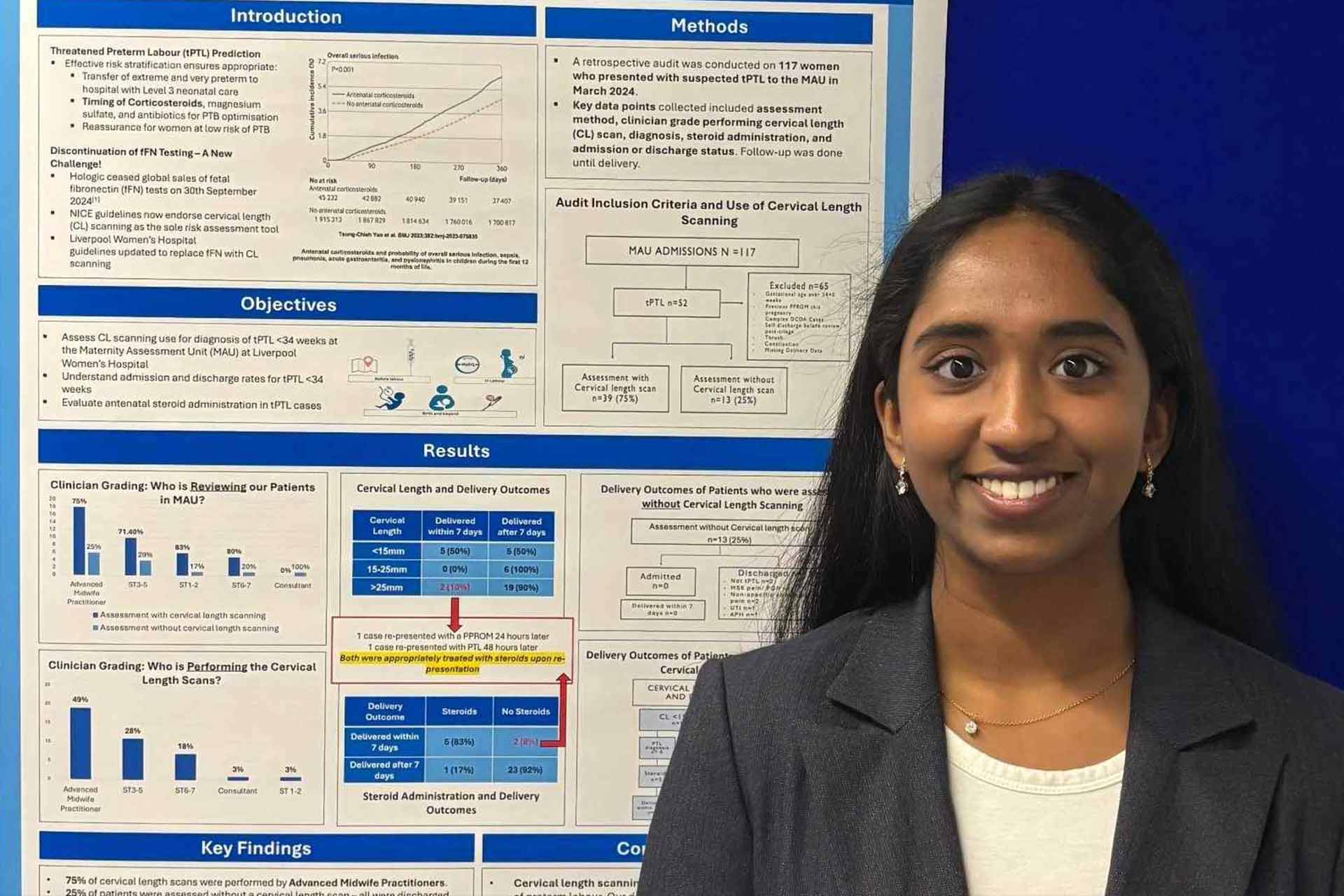
Congratulations to Year Three Student Doctor Praveena Sekar who not only was chosen to present her research at the UK National Preterm Birth Conference at the Royal College of Obstetricians and Gynaecologists in London this month, but also picked up top prize at the recent Liverpool Future Surgeons Conference at Aintree Hospital.
I first learned about the UK National Preterm Birth Conference through my incredible supervisor, whose guidance and mentorship have been invaluable throughout our research journey. Recognising the opportunity to share our findings and engage with others in the field, they encouraged me to submit an abstract. Throughout the course of the project, I developed a growing interest in preterm birth, particularly in how we can better identify high-risk pregnancies and enhance clinical outcomes. After dedicating months of work to the project, we felt it was essential to contribute our insights to the ongoing dialogue surrounding preterm labour and the improvement of outcomes for both mothers and babies.
One of the key insights I’ve gained is that preterm birth affects more than just the baby in the immediate term—it has long-lasting impacts on the child’s development, the family’s well-being, and society as a whole.
The emotional, physical, and financial toll can be immense, yet these effects are often not fully appreciated by the wider public. Through my research, I’ve also come to realise how important it is to raise awareness about the various risk factors associated with preterm birth, such as maternal health conditions, age, and access to quality prenatal care. By addressing these risks early on, we can improve outcomes and offer better support to families, ultimately making a meaningful difference in their lives.
.jpg)
Preterm labour predictors
My research focused on evaluating cervical length scanning as a tool for the prediction of preterm labour (PTL). With the removal of the fetal fibronectin PTL prediction swab from the UK market, it's important to explore alternative methods for identifying women at the highest risk of preterm birth. This enables the provision of timely interventions, for example targeting a course of antenatal steroids to those who need them most, while also preventing unnecessary treatments for women unlikely to deliver prematurely.
I have stayed in touch with my previous RS supervisor and have remained keen to contribute to ongoing research and audits where possible. While balancing medical school commitments, I have made an effort to stay engaged in research in my spare time, approaching each opportunity with professionalism and a willingness to learn. Even in smaller roles, I have valued the chance to develop my skills and contribute meaningfully to the project.

Sharing on a national stage
Presenting at the UK National Preterm Birth Conference was both exciting and nerve-wracking, as it marked my first-time presenting any research.
It was an incredible opportunity to share my work with leading experts in the field, and the experience taught me a great deal about effectively communicating complex research.
The confidence I gained from this experience was invaluable, and by the time I presented at the Future Surgeons Conference - my second presentation - I felt much more at ease and confident in delivering my research.
I am actively involved in several societies and roles to enhance my skills and knowledge in obstetrics and gynaecology (O&G) and surgery. As the founder and president of the Women in Surgery Society and regional lead for the Women in Surgery Students Association, I’ve connected with like-minded individuals, collaborated with other university societies, and have been organizing events and conferences for other aspiring surgeons. These roles have also provided me with opportunities to meet inspiring surgeons and professionals, which has been both motivating and educational.
.jpg)
Actively engaging in my O&G and surgery placements over the past year has also been invaluable, allowing me to maximize my understanding of these specialties through hands-on experience.
Additionally, being involved in surgical research across various specialties including obstetrics, colorectal surgery and breast surgery has also deepened my understanding of areas I am passionate about, broadening my knowledge of surgical research. These experiences have played a key role in my growth as a medical student and in shaping my future career path.
Stay curious!
My advice to other students would be to get involved as much as possible. Whether through societies, clinical placements, or research, gaining hands-on experience is essential to truly understanding the specialties you’re interested in.
Connecting with others - whether peers, mentors, or professionals - is just as important. Surrounding yourself with passionate individuals keeps you motivated and helps you learn more. Don’t hesitate to take on leadership roles or start projects, even if it feels intimidating at first. These experiences can build both your skills and confidence. And above all, stay curious and keep learning - continuing to grow is the key to success.
Discover more
- Share the same passion for O&G and surgery? Why not check out the fantastic Women in Surgery Society which Praveena founded, as well as SNOGS and many surgical focused societies available on Liverpool Guild of Students.
- Looking to capitalise on research opportunities here at Liverpool? Head to the Student Research section of the student intranet to see how the School can support you.